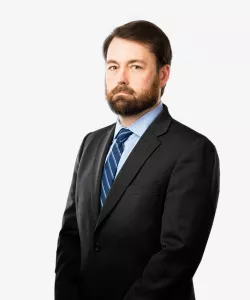Ohio Federal Court Rules Business Interruption Coverage Extends to Loss of Use of Property Due to State-Ordered Closures
On January 19, 2021, the U.S. District Court for the Northern District of Ohio Eastern Division ruled in Henderson Road Restaurant Systems, Inc. dba Hyde Park Grille, et al. v. Zurich Am. Ins. Co., No. 1:20-cv-01239, that a commercial insurance policy business income coverage form issued by Zurich American Insurance Company provided coverage to several steak and seafood restaurants in Ohio, Pennsylvania, Michigan, Indiana, and Florida which closed in response to state governmental orders restricting the operations of restaurants in an effort to abate the spread of COVID-19.
Insurer’s Arguments
In support of its motion for summary judgment, Zurich argued that plaintiffs’ economic losses were not covered by the policy as a matter of law because they were not caused by “physical loss or damage to property.” Alternatively, Zurich argued that, even if there had been direct physical loss to plaintiffs’ property, the policy’s microorganism exclusion would exclude coverage. Boiled down to its essence, Zurich argued that the underlying cause of loss was COVID-19, that COVID-19 is a microorganism, and that the microorganism exclusion applies. Other arguments proffered by Zurich were (i) the policy’s Civil Authority provision does not apply because the states’ orders did not “prohibit access” to plaintiffs’ premises, but rather permitted plaintiffs to continue to operate on a carry-out and delivery basis and therefore did not prohibit access to plaintiffs’ restaurants as required by the policy, and (ii) the Civil Authority coverage is inapplicable because the states’ orders did not respond to a direct physical loss of or damage to property located within one mile from the premises.
Insureds’ Arguments
In opposition, plaintiffs argued that Zurich could have easily drafted the policy language to limit coverage to physical or structural alteration/damage to tangible property, but instead, Zurich chose the language “direct physical loss of or damage to property,” contending that “direct physical loss of” includes an inability to possess something in the real, material or bodily world, and that the government orders caused plaintiffs to lose their property in some manner – pointing out that Zurich’s policy does not state that “direct physical loss of or damage to property” required “physical alteration or structural damage to any property at the Insured Premises.” Plaintiffs also argued that the microorganism exclusion does not apply because COVID-19 was not the underlying cause of plaintiffs’ loss, acknowledging that the government closure orders were issued in response to COVID-19, but arguing that they were not actually caused by COVID-19 and that Zurich’s interpretation of the policy’s anti-concurrent causation language would expand the microorganism exclusion far beyond anything the parties could have reasonably intended or understood.
In support of their own summary judgment motion, plaintiffs argued that they are entitled to coverage if they show that (i) they necessarily suspended their operations, (ii) they suffered a loss of business income due to the suspension of their operations, (iii) the suspension was caused by a direct physical loss to property or premises and (iv) the loss or damage was directly caused by a covered cause of loss. Plaintiffs also argued that none of the policy’s exclusions preclude coverage, including the microorganism exclusion and the loss of market or delay exclusion. Finally, plaintiffs argued that Zurich acted in bad faith in denying coverage and sought summary judgment on that claim as well.
The Court’s Ruling
The Court granted plaintiffs’ summary judgment motion on the insurance coverage issues. Construing the language of the policy liberally in plaintiffs’ favor, the court ruled that: (i) plaintiffs showed that their business operations were suspended by direct physical loss of or damage to property at the premises, and that there was a loss of business income due to the suspension of their operations, (ii) the loss or damage was caused by a “covered cause of loss,” (iii) the microorganism exclusion is inapposite because the losses at issue were caused not by COVID-19 itself, but by the government shutdown orders and although the insurer could have specifically included language to expressly exclude losses resulting from government-mandated closures, it did not, and (iv) the loss of use exclusion (excluding loss or damage caused by or resulting from loss of market, loss of use, or delay) does not apply because it would entirely vitiate the loss of business income coverage, which can reasonably be interpreted to extend coverage for the insured’s loss of use of the premises.
Finally, the court granted Zurich’s summary judgment motion on the bad faith claim, holding that Zurich had a reasonable justification for denying coverage based upon the “growing consensus of courts” that have rejected COVID-19 business interruption claims.
The court was of the view that its order on the coverage issue “involves a controlling question of law as to which there is substantial ground for difference of opinion and because an immediate appeal from this order may materially advance the ultimate termination of the litigation.” The court therefore certified the legal issue for interlocutory appeal pursuant to 28 U.S.C. § 1292(b).
This decision demonstrates that there is a panoply of factors that impacts judicial decisions in these cases, particularly policy language—including the presence of virus, microorganism, and other exclusions, and the definition of direct physical loss or damage—and the strategies employed by the parties seeking or rejecting coverage. Results vary from jurisdiction to jurisdiction, and no clear pattern of any significant precedential value has emerged to date.
Contacts
- Related Industries



